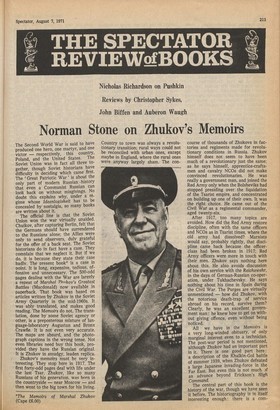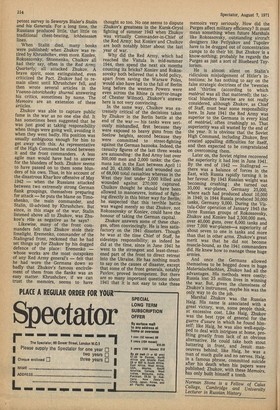Norman Stone on Zhukov's Memoirs
The Second World War is said to have produced one hero, one martyr, and one victor — respectively, this country, Poland, and the United States. The Soviet Union was in fact all three together, though Soviet historians have difficulty in deciding which came first. The 'Great Patriotic War' is about the only part of modern Russian .history that even a Communist Russian can look back on without misgivings. No doubt this expl-ains why, under a regime whose Ideenlogiskeit has to be concealed by nostalgia, so many books are written about it. The official line is that the Soviet Union won the war virtually unaided. Chuikov, after capturing Berlin, felt that the Germans should have surrendered to the Russians alone; the Allies were only to send observers, duly grateful for the offer of a back seat. The Soviet historians do in fact have a case. They complain that we neglect it. But if we do, it is because they state their case badly. The present book* is a case in Point. It is long, expensive, tedious, offensive and unnecessary. The 500-odd pages dealing with the War are largely a repeat of Marshal niikov's Greatest Battles (Macdonald) now available in paperback. That book was based on articles written by Zhukov in the Soviet Army Quarterly in the mid-1960s. It was ably translated, and makes good reading. The Memoirs do not. The translation, done by some Soviet agency or other, is a preposterous mixture of language-laboratory Augustan and Bronx Crawfie. It is not even very accurate. The maps are absurd, and the photograph captions in the wrong tense. Not ern libraries need buy this book, provided they have the Russian original. It is Zhukov in smudgy, leaden replica. Zhukov's memoirs must be very interesting. They stop here in 1917. The first forty-odd pages deal with life under the last Tsar. Zhukov, like so many Russians of his generation. was born in the countryside — near Moscow — and then went to the big town for his living. Country to town was always a revolutionary transition; rural ways could not be reconciled with urban ones, except maybe in England, where the rural ones were anyway largely sham. The con course of thousands of Zhukovs in factories and regiments made for revolu tionary conditions in Russia. Zhukov himself does not seem to have been much of a revolutionary just the same; as he says himself, apprentice-craftsmen and cavalry NCOs did not make convinced revolutionaries. He was really a government man, and joined the Red Army only when the Bolsheviks had stopped presiding over the liquidation of the Tsarist empire, and concentrated on building up one of their own. It was the right choice. He came out of the Civil War as a regimental commander, aged twenty-six.
After 1917, too many topics are avoided. How did the Red Army restore discipline, often with the same officers and NCOs as in Tsarist times, where the old army had dissolved? Marxists would say, probably rightly, that disci pline came back because the officerclass had been broken in 1917; Red Army officers were more in touch with their men. Zhukov says nothing here about this. He also avoids discussion of his own service with the Reichswehr, in the days of German-Russian co-operation, under Tukhachevsky. He says nothing about his time in Spain during the Civil War. The Purges are virtually unmentioned — how did Zhukov, with the notorious death-trap of service abroad on his record, survive them? Clearly, he was an excellent govern ment man : he knew how to get on without giving offence, even without being noticed.
All we have in the Memoirs is a very long-winded obituary, of only marginal interest even to a technician. The post-war period is not mentioned, although Zhukov had an important part in it. There is one good part here : a description of the Khalkin-Gol battle of summer 1939, when Zhukov defeated a large Japanese invading-force in the Far East. But even this is not much 3f an advance beyond Erickson's High Command.
The central part of this book is the history of the war, though we have seen it before. The historiography is in itself interesting enough : there is a corn petent survey in Seweryn Bialer's Stalin and his Generals. For a long time, the Russians produced little, that little on traditional chest-beating, ichbesessen lines.
When Stalin died, many books were published; when Zhukov was retired by Khrushchev, even more. Koniev, Rokossovsky, Shtemenko, Chuikov all had their say, often in the Red Army. Quarterly; all attacked Zhukov. A brave spirit, soon extinguished, even criticized the Pact. Zhukov had to remain silent until Khrushchev fell, and then wrote several articles in the Voenno-istorichesky zhurna/ answering his critics, sometimes by name. The Memoirs are an extension of these articles.
Zhukov was able to capture public fame in the war as no one else did. It has sometimes been suggested that he was just good at taking responsibility when things were going well, avoiding it when they went badly. His position was usually ambiguous enough for him to get away with this. As representative of the High Command he stood between it and the front commanders. A less agile man would have had to answer for the blunders of both. Zhukov seems to have passed on to them some blunders of his own. Thus, in his account of the disastrous Khar'kov offensive of May 1942 — when the Russians attacked between two extremely strong German flank groupings, themselves preparing for attack — he puts the blame on Timoshenko, the main commander, and Stalin, ill-advised by Khrushchev. But since, in this stage of the war, Stalin listened above all to Zhukov, was Zhukov's rOle as negative as he says?
Likewise, many of the front commanders felt that Zhukov stole their limelight. Eremenko, commander of the Stalingrad front, reckoned that he had set things up for Zhukov by his dogged defence of the place : Eremenko — whose works are the most outspoken of any Red Army general's — felt that he had worn the Germans down so badly that Zhukov's famous encirclement of them from the flanks was an easy matter. Khrushchev, if we can trust the memoirs, seems to have thought so too. No one seems to dispute Zhukov's greatness in the Kursk-Oryol fighting of summer 1943 when Zhukov was virtually Commander-in-Chief of the Red Army; but Koniev and Chuikov are both notably bitter about the last year of war.
Why did the Red Army, which had reached the Vistula in mid-summer 1944, then spend the next six months counting its bricks? Koniev and Rokossovsky both believed that a bold policy, apart from saving the Warsaw Poles, would also have led to the fall of Berlin long before the western Powers were even across the Rhine (a mirror-image of Chester Wilmot). Zhukov's answer here is not very convincing.
In the same way, Chuikov was extremely critical of the decisions taken by Zhukov in the Berlin battle at the end of the war — his tanks were seriously mishandled, first because they were exposed to heavy guns from the Seelow heights, second because they were committed to street-fighting against the German bazooka. Indeed, the casualty figures of the last three weeks are astounding : the Red Army lost over 300,000 men and 2,000 tanks; the Ger mans lost in the East between April 11 and 20, 43,000 killed and wounded out of 68,000 total casualties whereas in the West they lost under 2,000 killed and wounded against 270,000 captured.
Chuikov thought he should have been allowed to manoeuvre, instead of fighting directly in this bitter way for Berlin; he suspected that this terrible battle was waged merely so that Zhukov, not Rokossovsky or Koniev, Mild have the honour of taking the German capital.
Zhukov answers some of these charges, often convincingly. He is less satis factory on the 1941 disasters. Though he was at the time Chief of Staff, he sidesteps responsibility; as indeed he did at the time, since in June 1941 he went to the strongest and least-threatened part of the front to direct retreat into the Ukraine. He has nothing much to say on the causes of disaster, except that some of the front generals, notably Pavlov, proved incompetent. But there are so many important questions about 1941 that it is not easy to take these memoirs very seriously. How did the Purges affect military efficiency? It must mean something when future Marshals like Rokossovsky, outstanding aircraft designers like Petlyakov and Tupolev have to be dragged out of concentration camps to do their bit. But Zhukov is a know-nothing; probably he regards the Purges as just a sort of Bluebeard Taylorism.
He is almost silent on Stalin's ridiculous misjudgement of Hitler's intentions; he has nothing to say on the false strategic doctrines of the 'twenties and 'thirties (according to which materiel was all that mattered); the tactical blunders likewise are not really considered, although Zhukov, as Chief of Staff, must bear some responsibility here. In June 1941 the Red Army was superior to the Germans in every kind of materiel, often crushingly so. That superiority was all wasted by the end of the year. It is obvious that the Soviet High Command, including Zhukov, first created appalling difficulties for itself, and then expected to be congratulated on overcoming them.
Later on, the Soviet regime recovered the superiority it had lost in June 1941. By the end of 1942 — Stalingrad — there was a balance of forces in the East, with Russia rapidly turning it in her favour. By 1943 Russian weight was becoming crushing : she turned out 35,000 war-planes, Germany 25,000, where each had produced about 10,000 in 1940; in 1944 Russia produced 30,000 tanks, Germany 9,000. During the Vistula-Oder operation of January 1945 the three Russian groups of Rokossovsky, Zhukov and Koniev had 2,500,000 men, over 40,000 guns, over 6,000 tanks and over 7,000 war-planes--a superiority of about seven to one in tanks and more than that in other arms. Zhukov's great merit was that he did not become muscle-bound, as the 1941 commanders did. He knew how to manage these huge armies.
And once the Germans allowed themselves to be bogged down in huge Materiaisch/achten, Zhukov had all the advantages. His methods were costly; Russia lost 25 million lives in winning the war. But, given the clumsiness of Zhukov's instrument, maybe his was the only way to do the job. Marshal Zhukov was the Russian Haig. His name is associated with a great victory, won, some people think, at excessive cost. Like Haig, Zhukov was the best type of general for the guerre d'usure in which he found him self; like Haig, he was also well-equipped to deal with intrigues at home, pro fiting greatly from lack of an obvious alternative. He could take both stout battering in front, and Jesuit man oeuvres behind; like Haig, he was a man of much guile and no nerves. Haig, in a famous phrase, committed suicide after his death when his papers were published; Zhukov, with these Memoirs, has only built himself a tomb.



































 Previous page
Previous page